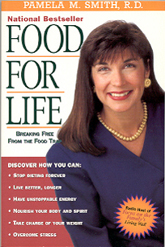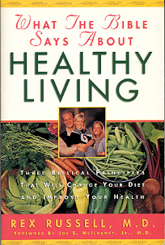

|
FURTHER READING |

 |
|
||||||||||||
|
|
||||||||||
|
||||||||||
| Every day we are bombarded with the latest nutritional information from the so-called experts. Unfortunately, so much of the information contradicts itself that it can leave your head spinning. That which was deemed healthy one day is found unacceptable the next. It seems like every day a new food causes cancer in laboratory rats. Listen for very long and you will be afraid to eat anything. That’s why I believe we should rely on an unchanging source of information – the Bible. The Bible has a lot to say about what we should eat, so I will touch on just a few of those things here. If we look in the Old Testament, the people were given clear instructions on the types of meat and fish to consume.First of all, let’s take a look at what the Bible says about meat. Leviticus 11:3 reads: “You may eat any animal that has a split hoof completely divided and that chews the cud.” Foods within these guidelines include deer, calf, sheep and goat. It DOES NOT include foods like dogs, horses, rabbits, rats, squirrels, cats or swine (more about this one later). Now let’s take a quick look at what the Bible says about eating fish. Leviticus 11:9-10 says: “Of all the creatures living in the water of the seas and the streams, you may eat any that have fins and scales. But all creatures in the seas or streams that do not have fins and scales – whether among all the swarming things or among all the other living creatures in the water – you are to detest.” So fins and scales are of great significance. Fish which fall into this category include black bass, cod, haddock, halibut, pike, rainbow trout, salmon, sea bass, bluefin tuna, white perch and black drum. Not included in this list would be catfish, clams, crabs, eel, lobster, octopus, oysters, puffer, scallops, shark, shrimp, squid and stingray. Why is the differentiation made between “scales and fins?” Let’s take a look at some of the fish which did not make the list. Catfish, which do not have scales and fins, are bottom-feeding scavengers which live off the waste of other marine life. Their main purpose is to keep the ocean waters clean. Shellfish, like lobsters and crabs, serve much the same purpose. Lobsters and crabs act as living sea filters. They filter and purify the water by absorbing into their bodies the pollutants and bacteria that they extract. That is one reason eating the meat of lobsters, crabs, scallops and shrimp can easily cause sickness if not prepared correctly. In a nutshell, you could say that the fish we are to avoid are there to help purify the water for the fish which are to be consumed. Now, about pork. Though one ad campaign touts pork as “the other white meat,” I doubt if you would find a nutritionist anywhere who would recommend eating large amounts of pork on a regular basis. But why? Like catfish, swine are scavengers which will eat anything put before them – everything from trash to raw sewage. Their digestive systems, much like ours, are very acidic. But because of the huge volumes of food they consume, those digestive acids are diluted which allow parasites, bacteria, viruses and toxins to pass through to the flesh. Obviously, those toxins can be passed along to us as we eat the flesh of the pig. How about birds? Are there Biblical guidelines concerning the types of fowl to be consumed? Yes there are. Acceptable birds to eat include duck, quail, turkey, chicken and goose. Those which would not be acceptable include bat, eagle, falcon, hawk, ostrich, owl, pelican, raven, stork and vulture. I am not taking the time here to mention fruits and vegetables because I feel it is generally indisputable that a healthy diet should consist of both. Another prominent food in the Bible is olive oil, which is why I still prefer it above other oils such as peanut oil, canola or shortening. I also prefer real butter (in moderation) as opposed to a mix of chemicals that have been hydrogenated to look like butter. Butter may not be the best thing to eat, but at least your body knows what it is and how to digest it. Artificial butter, like artificial sweeteners, are nothing more than chemicals designed to replicate the taste of certain foods. Your body doesn’t quite know what to do with these chemicals. For the sake of clarity, let me add this. I am not advocating a Kosher diet, which is something altogether different. Nor am I saying you should never partake of a particular food that I have pointed out to be on the “unacceptable” list. This is merely to be used as a guideline as you plan your daily intake of food. However, if any of the unacceptable foods comprise a major portion of your diet, I would recommend thinking about some changes. If you take the time to compare the “appropriate” and “inappropriate” foods listed above with today’s nutritional information, I think you will find that the “acceptable” foods are far healthier than those on the “unacceptable" list. Coincidence? I don’t think so. Some of you might also be questioning the relevance of Old Testament scripture to today. While the New Testament makes it clear that we are not spiritually sanctified, or made clean, based on what we eat, (or by keeping the Old Testament law, for that matter) that is not to say that certain foods are not healthier for us to eat than others. If you believe that we are created by God, then it is reasonable to assume that He knows better than anyone how to keep our bodies healthy. Eating the things He says to eat and avoiding the things He says to avoid is a very good start. |
||||||||||
|
|
||||||||||
Copyright ©2002-2016 Ron Durham Enterprises. |
||||||||||